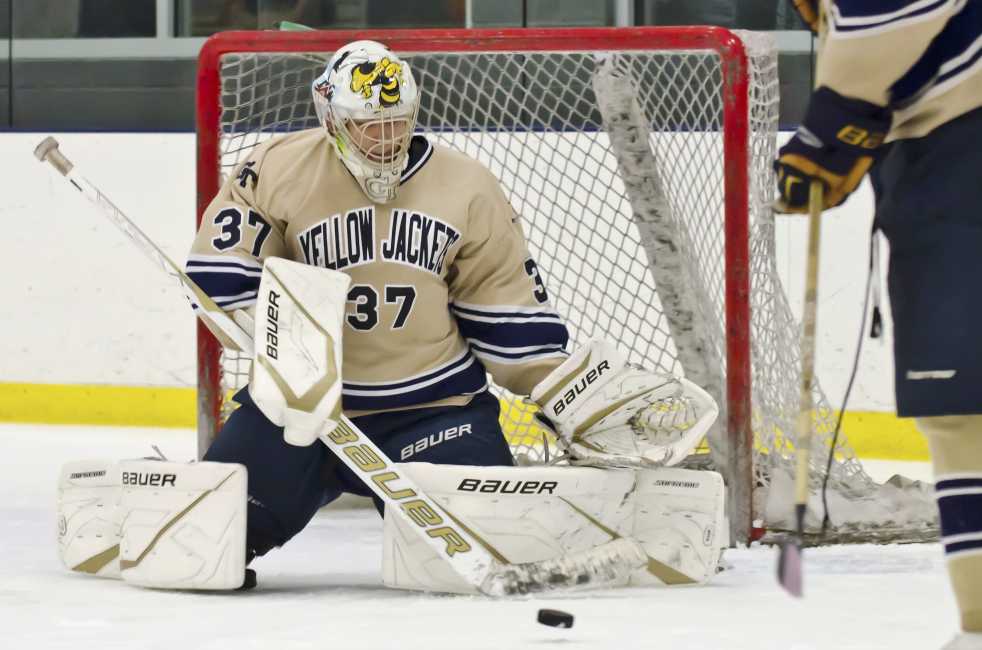Tech’s club ice hockey team began its 31st season last week and is hoping to take a shot at the postseason this year.
Led by head coach Brian McSparron, the team returns 18 out of 21 players from last year’s roster. The amount of experience the team is returning with should serve them well as they compete in the southeast division of the American Collegiate Hockey Association.
Matt Zaske is a sixth-year student and has been playing as a defenseman for the team since 2008, his freshman year. His teammate Michael Klein is a fifth-year goaltender and has been with the team since 2010.
As Klein describes, the team has set one major goal to strive for this season: make it as far into the playoffs as possible.
“We want to make it to regionals and ultimately nationals,” Klein said. “We play in the southeast division, where the top two teams go straight to nationals and the [next eight] teams play in a regional tournament. So we’d like to be ranked in the top ten, go to regionals and maybe even nationals after that.”
The team competes against many of the big-name schools in the southeast, including UGA, Clemson, Florida State and Florida.
“I would say it is almost at the level of being as competitive [as a varsity sport],” Zaske said. “It essentially is a varsity sport without being called one or receiving the same amount of funding that NCAA programs would. There’s obviously a talent drop versus a Boston College or Wisconsin, but that drive and competitiveness is still there.”
Since they are a club team, GT Hockey faces a lot of challenges that members of a varsity sport take for granted. Sport clubs are not part of the Athletic Association, so they do not receive nearly the same number of benefits that varsity teams do.
The majority of the team’s budget comes from the Student Government Association (SGA), and players have to pay dues and buy their own equipment. The team does not have access to the same facilities or personnel that varsity teams do, and they cannot give scholarships or recruit players.
The team also does not play games on campus; instead, they must travel about 45 minutes away.
“We pay more dues than any other club, and the expense is a big issue for a lot of people,” Klein said. “It’s a very expensive sport, and most people have to pay for themselves.”
The team also does not play games on campus; instead, they must travel about 45 minutes away for every home game. Games can start as late as 10:00 p.m., and practices, which are held on weeknights, usually start at 10:40 p.m., with the players not getting back to campus until 1:30 a.m.
Despite all of these difficulties, the players still commit for the love of the game.
“It’s a pretty hefty commitment,” Zaske said. “We practice twice a week for now, about six hours a week. Friday and Saturday nights are pretty much completely dedicated to the hockey team, and sometimes Sunday. We play two games a weekend from now until February.”
“Everybody also works out and keeps in pretty good shape on their own, and we do team workouts at the CRC on Mondays,” Klein added. “It takes a lot of time, but it’s a lot of fun.”
The work does not stop when the season ends, either.
“Usually in the summers, if we have enough guys who are staying in town, we put together a team that will play in a summer league,” Klein said.
He also mentioned that many players will run pi miles or go to the gym to stay in shape.
The team also experiences a level of chemistry that could even rival varsity teams.
“We have a pretty tight team,” Klein said. “All my best friends at Tech are from the hockey team. I’m getting married in May, and the guys in my wedding are from the team. [There are] definitely lifelong bonds. We all pretty much live together as roommates.”
“It’s a pretty tight-knit group. We always hang out with each other on the weekends or whenever we have days off,” Zaske said.
The team aspires to have a level of intensity and excitement comparable to that of a football game. The pep band already attends a few games a year, but in order to achieve this goal, the team needs the support of the student body.
“We want to get people to come out to the games and just experience it,” Zaske said. “It is a good time: games are usually very exciting and fast paced, and we’d really like to have a more present student body at our games, to get that football game vibe with a rowdy student section.”
Klein made the most convincing argument to attend a game.
“It’s entertaining and we kick UGA’s ass every year,” Klein said.
